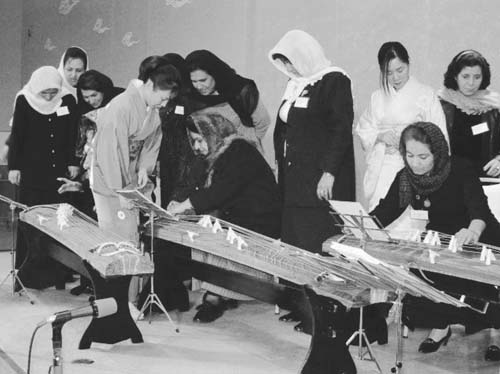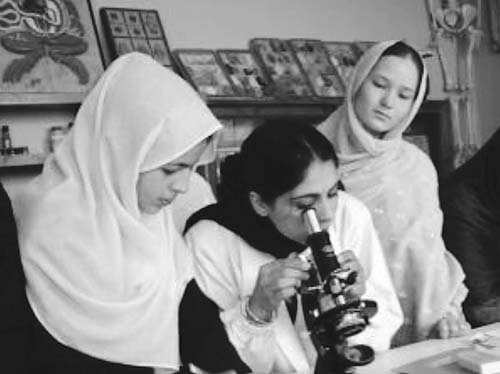Japan's Official Development Assistance White Paper 2006
Column II-1 Support for Afghan Women Spread Among the People: Training in Japan for Afghanistan Women Education Leaders
The gap between male and female education is a serious problem in Afghanistan, which suffered devastating damage over a quarter century of warfare. Under the Taliban administration that lasted five years from September 1996, female education and employment were strictly prohibited, making the primary education attendance rate an estimated 3% for girls, while it was 38% for boys in 1999.
Right after the conflict ended, in December 2001, the inaugurated Afghanistan Interim Authority identified the necessity of education as one of the challenges for the country's reconstruction. The importance of education for women in particular was further emphasized at the International Conference on Reconstruction Assistance to Afghanistan, sponsored by Japan in January 2002. Moreover, the Government of Japan proposed a project to promote women's education as part of the educational assistance from Japan to Afghanistan. The proposal was announced in April 2002 by the then Minister of Education, Culture, Sports, Science and Technology Atsuko Toyama on the occasion of a visit to Japan by the then Minister of Education Abdul Rasul Amin of Afghanistan. This commitment of the Japanese Government originated from attention to the importance of female education and support for Afghan women, who had been kept away from opportunities to receive education under the Taliban administration.
Commissioned by the Japan International Cooperation Agency (JICA), five major women's universities (Ochanomizu University, Tsuda College, Tokyo Woman's Christian University, Nara Women's University, and Japan Women's University) agreed to accept as trainees female teachers in leadership positions in Afghanistan, including principals of primary and middle schools. About one month of training was provided in an aim to develop education and raise the female school attendance rate in Afghanistan. Trainees received lectures on the reconstruction of education in postwar Japan and how teachers are trained and how schools are organized and operated in Japan. They also took tours to national, public, and private-run schools; observed actual classes; and also visited educational facilities for disabled children. The program received 61 female teachers from Afghanistan during the four years from 2002 through 2005. After returning home, these female teachers conveyed their experiences in Japan to their fellow teachers and students in striving to apply their acquired know-how in class management and school administration.
This training program is seen as a new form of commitment, with the five women's universities creating a consortium and joining JICA's training operations with the goal of supporting female education in Afghanistan. The program was participated in by about 450 teachers and students in total from these universities during the four years of training. These universities are working to contribute to the promotion of Afghanistan's female education, utilizing their experiences in developing female education through their own paths since the Meiji Period of the late 19th century. These universities also seek to jointly deliberate on challenges posed to women in post-conflict regions in terms of education and social and economic problems. Now, this training program has served as the springboard for further efforts of assistance extended by many other women's universities in Japan.
The new Constitution of Afghanistan established in January 2004 clearly stipulates that the nation must provide free primary and intermediate education to all citizens, impartially for both men and women. Based on this idea, an emphasis on female education is stipulated in the Interim-Afghanistan National Development Strategy presented by the Government of Afghanistan in January 2006. Further pushed by support from the international community, the female school attendance rate in the country marked an increase. The female teachers who underwent this training program are expected to play increasingly important roles in the country, whose further development depends largely on education.

Women teachers learning about Japanese culture in between their training programs (Photo: Nara Women's University)

A woman student looking into a microscope during a science class at Marian Lyceum High School, Afghanistan (Photo: Nara Women's University)


 Next Page
Next Page